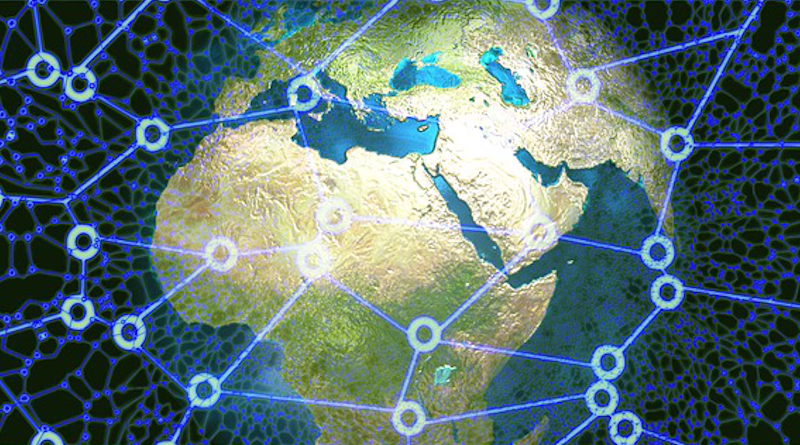
Throughout its history, the continent of Africa has grappled with a variety of formidable obstacles including tribalism, colonialism, democratic deficits and widespread corruption. Although the continent has an abundance of natural resources, Africa remains entrenched as the least prosperous continent.
Despite the low concentration of wealth, recent economic expansions and the large and young population make Africa an important economic market in the wider global perspective. The African continent has gradually emerged as the centre of great power rivalry between China and the US. With one of the fastest-growing economies, a broadening consumer market and a surging youth population, the continent has recently experienced deepening competition between China and the US. Africa possesses 40 percent of the world’s gold reserves, along with up to 90 percent of its chromium and platinum. Additionally, the continent holds the largest reservoirs of cobalt, diamonds, platinum, and uranium globally which underscores the importance of the continent as perceived by the major powers.
The US and Africa have preserved bilateral relations since 1994, post African apartheid. The US-African relations experienced an uplift when under President Bush’s administration, PEPFAR—The US President’s Emergency Program for AIDS was initiated—a large-scale effort to fight Aids in Africa, which historians regard as his significant accomplishment. The relations experienced a further boost after the 2008 elections, when Barak Obama, an American President of African descent, got elected as the President of the United States, creating enthusiasm throughout the continent. The commencement of the US-Africa leaders’ summit under his presidency was the largest gathering of US and African leaders at that time, which woefully failed to translate into strong actions. Since the latest US-African leaders summit held in December 2023, the Biden Administration pioneered an exceptional year of US engagement with Africa. The Biden-Harris Administration is going above and beyond its commitment to invest $55 billion in Africa over three years. The US is vigorously engaged in these endeavours, motivated by its deep-rooted strategic interests in the vast and dynamic continent of Africa.
The significance of Africa for the United States is evident in the remarks made by the Secretary of the State, Anthony J. Blinken “The Unites States know that, on most of the urgent challenges and opportunities we face, Africa will make a difference; The US firmly believes that its time to stop treating Africa as a subject of geo-politics and start treating it as a major geo-political player it has become”. Recently the US welcoming the African Union as the permanent member of the G20, acceleration of high-level engagement of State officials, expanding trade and investment partnerships, and advancing major food and health security investments has clarified the importance of Africa for the US. The assistance and aid provided by the US to bring to an end 547 new deals for an estimated value of $14.2 billion in new two-way trade and investment cannot be over looked.
Delving into the intricacies of China and Africa, both China and Africa have always engaged in boosting momentum and solidifying their links, especially when it comes to trade and the promotion of African exports. China-Africa Economic and Trade Expo held in 2023, evidently recorded 100,000 visitors and agreed upon an investment worth a total of US $10.3 billion. China’s substantial financial commitments, deep-seated cultural and political engagements, deepening bilateral and multilateral political ties with the African states and its active induction of Chinese culture through Confucius institutions have also been prominent.
China’s economic power has extended its capacity to facilitate partnership with Africa via FOCAC—The Forum on China-Africa Cooperation. Earlier in 2023, China inaugurated Africa’s Centre for Disease Control and Prevention in Ethiopia and also gifted a parliament building to Zimbabwe which was a US $200 million project financed and constructed by the Chinese Government. These flagship diplomatic initiatives, specifically in Africa have been remarkable. These manoeuvres highlight China’s capabilities as a facilitator of modernization and progress. China has been Africa’s largest trading partner since 2009 overtaking the US and continues to be by far its largest trading partner as of 2022.
China’s presence and generous investments in Africa have triggered insecurity in the US. The US-China rivalry in Africa is propelled by their competition for energy resources in Africa. The continent is rich in resources like oil and natural gas and China’s energy and oil engagement in the continent is so expansive and so profound that it has provoked insecurity for the US. Many of China’s activities are perceived as a challenge to US foreign policy interests in Africa. The increased presence of China and the United States in Africa has transformed the continent from being previously regarded as non-strategic to becoming pivotal in the geopolitical rivalry between the world’s two largest economic powers.
China presents both economic and security challenges for the US in Africa, as its aims extend beyond the mere extraction of oil and mineral resources. Instead, China perceives the continent as a significant source of markets and investment opportunities. It is apparent that infrastructure diplomacy is the key to China’s influence in the continent with major focus on the African countries like Angola where China agreed to provide infrastructure investment of US$ 18bn and Kenya where it granted a debt of US$ 6.83bn for infrastructure development.
The US, still considered the world hegemon, is struggling to come to terms with the reality that China is a dominant force on the rise, this further provokes the rivalry while the US tries to counterbalance it by giving a little more attention to the continent. Both the US and China recognize the significance of Africa, with both countries showing strategic interest in the continent. The US, as usual, aims to maintain its global leadership and hegemony. The emergence of strategic rivalry between these powers in Africa mirrors previous dynamics seen in the Indo-Pacific region. Africa, now receiving unprecedented attention and benefits from both nations, appears to be striving to maintain a delicate balance.
